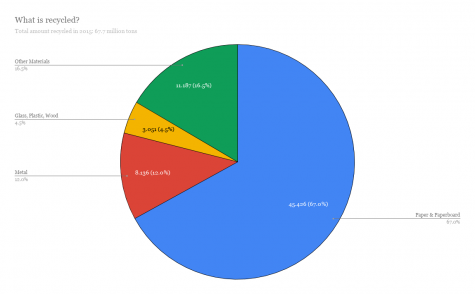Recycling? Maybe. Reduce, reuse, rot instead.
Illustration: Elizabeth Trevathan
Recycling may be the default habit, but it’s time to compost instead
“Reduce, reuse, recycle” has become a popular mantra in the era of climate change. The three R’s were going to save the planet, as long as society followed them as laws. Now, the third R, recycle, needs to be replaced by rot. To limit the number of materials needed to be recycled, we need to compost whenever possible.
In 2018, China’s ban on the importation of 24 categories of waste went into effect, and thousands of tons of recyclable materials started piling up in warehouses. A lot of the recyclable waste is being thrown away because facilities don’t have the area to store it until it can be recycled through US’s limited equipment.
Our climate is in a state of serious emergency. Recycling has been seen as an easy way to be environmentally friendly, but now that option is disintegrating.
Before China’s ban, the only threat to paper in the recycling system was glass. Glass breaks easily; even if it is not broken when it is in the recycling bin, it breaks on the way to the facility. When the glass mixes with paper and aluminum in single-stream recycling, the products are harder to process, and the quality of the recycled material decreases as well as injures the machinery used. Paper and aluminum that is contaminated by the glass are less likely to be recycled.
Becoming eco-friendly has come back to square one. The first step in becoming eco-friendly is to compost.
Now, thousands of tons of recyclable materials are stockpiled in recycling facilities, waiting to be recycled or thrown away. For many materials, such as plastic, recycling is the only option. In 2015, 9 percent of plastic discarded was recycled with the remainder either ending in the landfill or combusted. Paper, on the other hand, has other options. In 2015, 67 percent of discarded paper was recycled. Paper products that do not have a plastic coating or toxic chemicals in the ink, such as magazines, are capable of being composted quickly if shredded and they offer carbon to the composting process.
Composting allows for a natural alternative to recycling for paper products. At St. Paul Academy and Summit School, compost bins are strategically placed and easily accessible next to recycling bins. It is merely an option between tossing paper in a blue bin or a green bin and whether or not something happens to the paper or not. Composting paper is necessary in order to supply a renewal option for the material. When recycling, everyone thinks that the material is going to be pulled apart, crushed, and made into something new. When composting, the paper gets broken down to particles, naturally as it decomposes. In moderation, it provides a better composting environment for other materials, and then theoretically, it helps nutrition and grow another tree. Composting is the only way for paper to not be thrown away.

Paper overpowers all of the other materials in the bin.
Becoming eco-friendly has come back to square one. The first step in becoming eco-friendly, since 2018, is to compost. Compost facilities in Minnesota can be found at Minnesota Pollution Compost Agency, whereas more specific information on systems available, rules and regulations for Minneapolis can be found at Minneapolismn.org and for Saint Paul at Saint Paul Minnesota. Many counties and cities in Minnesota offer materials for at home composting including Minneapolis and the Recycling Association of Minnesota offers constant updates on when and where a Minnesota county offers at home compost bins.
St. Paul Academy and Summit School should offer easier compost solutions for students in classes and advisories in the temporary classrooms. Often, students will throw away their compostable napkins, tissues, and paper for the mere reason that they don’t want to carry it to the Huss Center or Shilling when they are rushing to class. Having that said, SPA offers many solutions to the recycling issue at hand with the many compost bins placed around the school. Students, teachers, staff and faculty need to take advantage of this and use it as much as possible.
The Minnesota Composting Council offers information on what is compostable and what is not, including things that are also recyclable such as paper products.
In order to move forward to becoming eco-friendly, communities need to start recycling. A new set of R’s has moved its way to popularity recently. The five R’s are a list of five things to do in order to live an eco-friendly life. Refuse. Reduce. Reuse. Recycle. Rot.
Elizabeth Trevathan is a co-Director of RubicOnline. Over the summer she played a tennis tournament to raise money for rare cancer research at Childrens'...